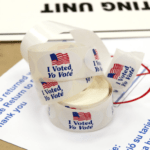I was raised with conflicting feelings about sports.
My brother was a bit of a jock, playing several sports, but especially excelling at wrestling. (Real wrestling, not that rasslin’ business you see on the television.) My sister was involved in cheerleading, which is at least kind of a sport. Depending on who you ask.
In any event, I was constantly jealous of them both. They were pretty and popular; I was nerdy and a bit standoff-ish. (Surprise, I know!)
My mother supported her kids’ sporting efforts. My father was more of a skeptic who thought that sports were useless. Torn between those two worlds and not blessed with much athletic talent to begin with, I generally participated in sporting activities against my will. My youthful sports adventures were mostly limited to two years of “minor league” (coach pitch) baseball and various gym class indignities.
I allegedly hit one home run in two years of organized baseball; my recollection of it was more like a single with three subsequent errors. (They didn’t really give out errors at that level.) Compounding the problem was that I was taught to bat right-handed even though I threw left-handed, and no one picked up on this obvious discrepancy.
After my parents’ divorce as an early teen, I grew more interested in sports, especially baseball. I even started crushing it in wiffleball and softball after someone thought to turn me around to bat left-handed. But I was too far behind to really catch up with my peers who had been playing baseball full-time for their entire lives.
So I overcompensated by watching buttloads of sports on television. The 1985 World Series was the first one I really paid attention to. I was thirteen. I have never fully recovered from the infamous bad call at first base in Game Six and the subsequent John Tudor/Joaquin Andujar/Whitey Herzog collective meltdown in Game Seven.
The football team of my youth was the St. Louis Cardinals. The football Cardinals. Also known as The Deadbirds. The Big Pink. Or, perhaps most colorfully, The Retardinals. I fondly recall Stump Mitchell, Roy Green, J.T. Smith, Jay Novacek, and Vai Sikahema prowling the rock hard turf of Busch Stadium II while Neil Lomax ducked and covered. Those teams were just good enough to be competitive while also being bad enough to break your heart. Then of course, they broke everyone’s hearts one final time by splitting town due to complaints about a twenty-one year old stadium. (Take notes on that stadium thing; you’ll be seeing it again in a few paragraphs.)
I didn’t pay much attention to hockey. It was an afterthought. I was well into middle age before I truly appreciated hockey and understood such things as the offside rule or a good penalty kill. Oh by the way, LGB!
Naturally on this side of Missouri, the biggest sports thing has always been the St. Louis Cardinals, perennial contenders. Everybody loves a winner. I rooted for them when I became interested in sports, but soon found them rather boring. Not because those teams were boring per se, because they definitely were not. Whiteyball, focused on speed, defense, and pitching, was the antithesis of boring. What bored me was that everyone around me was cheering for them, and that just didn’t work for me. I discovered that I liked to be different and I liked to root for underdogs.
So I instead adopted the Chicago White Sox as my main team for a number of years. The logic: Chicago wasn’t that far away, the team kind of sucked, the American League was weird and different, and the Sox needed fans since they were constantly overshadowed by the crosstown Cubs. (Plus, the mid-80’s White Sox had the absolute coolest uniforms. By 80’s standards, anyway.)
I kept rooting for the football Cardinals for a number of years even after they stopped sucking in St. Louis and started sucking instead in Phoenix. Like the White Sox, I felt sorry for them. Plus at that time in my life I was fascinated by Arizona and thought at some point I’d follow them out there. When the Rams moved to St. Louis in 1995, I switched my allegiance to them. In a cruel twist of fate, they would also split town years later due to (alleged) complaints about a twenty-one year old stadium. (Spoiler alert: it wasn’t really about the stadium.)
In between, I also learned to appreciate college basketball, college football, college baseball (the local teams anyway), and just about every sport besides maybe soccer and golf. And I’m even willing to give soccer a try once the new MLS team starts playing in St. Louis.
Yet, a large part of me remains skeptical about sports and their place in American life. We don’t just enjoy sports; we are obsessed with them. Pro sports bring in at least 100 billion dollars each year; college sports also bring in a big haul, though their profit/loss figures are murkier.
But it’s not just the money. It’s the prestige. Athletes, even mediocre ones, are placed on a pedestal in America. Go to any high school or college campus and you will find that the top of the social food chain is occupied by the jocks. Newspapers devote far more column inches covering high school and college sports than they do covering high school and college academics. Eat dinner at any red-blooded American family table and the conversation will be about the sporting exploits of the various kids. (Ask me how I know.)
It’s entirely possible to play sports at a high school, go to college for four years and play sports, then come back to your high school and coach there until the day you die. Some folks never spend more than four years of their lives outside of the high school they attended, and it’s just weird.
Also, there’s a better than average chance that the person teaching your children about history and government was actually hired mostly for his or her coaching ability. There’s an old joke that used to go around in my circles (that maybe I should’ve paid more attention to:)
Q: What is the most common first name of people who teach Social Studies?
A: Coach!
In the argument of college sports versus pro sports, they are both corrupt in their own way.
Pro sports, by definition, are mercenary. Players play for the highest bidders, and owners play in the cities that will make them the most profit or give them more money for a stadium. In fact, the public funding of stadiums is the biggest beef against professional sports.
College sports are considered more “pure.” After all, those teams can’t move. They’re stuck in whatever podunk town their college is in ad infinitum. Their players aren’t paid. Technically.
But are they really pure? The players are often “students” at the college in much the same sense that the Holy Roman Empire was “Holy,” “Roman,” and an “Empire.”
It’s an open secret that many big time athletes don’t go to class, or they receive significant assistance or leniency when they do. And though they’re not (usually) paid in the traditional (or legal) sense, many are on scholarship for their athletic abilities. “Athletic scholarship” is a contradiction in terms and always has been. We’ve simply stopped seeing the irony in it. Because, you know, go team.
Even if you disregard the free college degree, which is certainly worth something, there are many other examples of star college players receiving all kinds of other benefits. (Not even counting the groupies.) My own alma mater, while I was in school there, had a basketball player who allegedly couldn’t speak a lick of English, but got by because his brother was a famous NBA player. Bonus: our guy wasn’t even a good player.
There is some talk of actually paying college athletes above the table. I’m not sure how I feel about that. Then there’s this whole thing where college basketball or football coaches are the highest paid public employees in forty fucking states.
What I do know is that other countries are absolutely eating our lunch when it comes to education. China, for example, doesn’t much care about basketball, football, baseball, or hockey, but their kids can sure enough get a good education. In the economic war, the ability to throw a touchdown pass may not hold a candle to the ability to code. And while our big studly athletes may make for excellent foot soldiers in a shooting war, future wars are likely to be fought largely in the air and online as opposed to on the ground.
In any case, our obsession with sports is entertaining in the short run but potentially devastating in the long run. I’m not straight up saying that our focus on sports is the only reason our academics suck, because after all, it’s not a zero sum game. But there seems to be a definite relationship between those two things. It’s a cultural thing. Our priorities as a people are whacked.
Where, then, is the ideal place for sports in our future?
Pro sports would remain more or less the same, but without the ridiculous public money that goes into funding many of their palaces.
Ideally, every high school and college team would be a club team. Athletes would be real students who receive no benefit for playing, and their teams would raise their own operational funds. It would be generally recognized that sports are a distant second place priority to academics.
Render unto Education the things that are Education’s, and unto Sports the things that are Sports’.
So in other words: fat chance.




